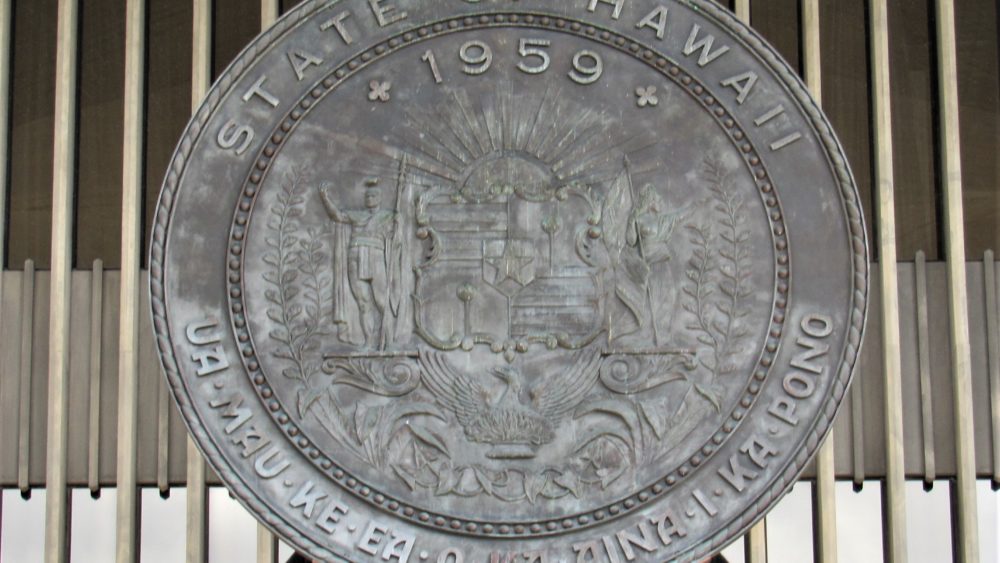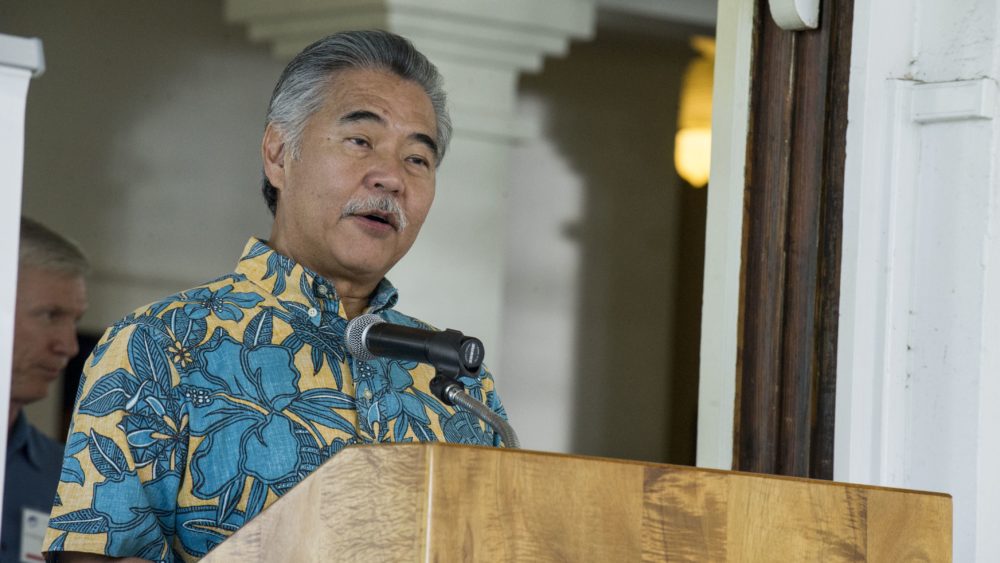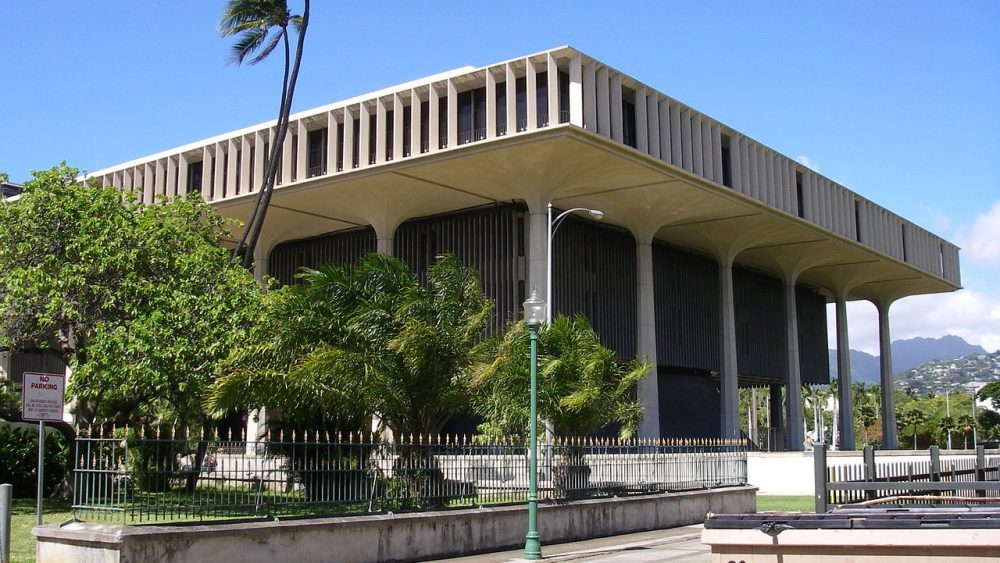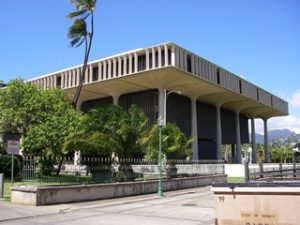May 6, 2022 •
Hawaii Legislature Adjourns Sine Die

State of Hawaii
The Hawaii Legislature adjourned its regular session sine die May 5. During the session, several bills related to campaign finance were introduced. House Bill 1423, with its last action on March 18, was introduced but has not passed. The bill […]
The Hawaii Legislature adjourned its regular session sine die May 5.
During the session, several bills related to campaign finance were introduced.
House Bill 1423, with its last action on March 18, was introduced but has not passed.
The bill set out to increase the fine for campaign spending law violations against a noncandidate committee making only independent expenditures and that has received at least one contribution of more than $10,000, or spent more than $10,000 in an election period.
House Bill 1423 would have allowed the campaign spending commission to order that the fine be up to three times the amount of the unlawful contribution or expenditure, and that the payment of the fine assessed against a noncandidate committee, or any portion thereof, be paid from the personal funds of an officer of the noncandidate committee.
This does not affect lobbyist reporting.
January 6, 2022 •
Hawaii State Capitol Building Closed for Legislative Session

State of Hawaii
Leading up to the January 19 start date of the 2022 legislative session, Hawaii state leaders in the Senate and House have announced the state Capitol will be closed to the public due to rising concerns over the continuing COVID-19 […]
Leading up to the January 19 start date of the 2022 legislative session, Hawaii state leaders in the Senate and House have announced the state Capitol will be closed to the public due to rising concerns over the continuing COVID-19 pandemic.
This announcement follows increasing numbers of positive COVID-19 cases across the state because of the Delta and Omicron variants.
The Capitol’s status will be reevaluated in the following weeks.
Additionally, the Senate and House floor sessions and hearings will be held remotely. There will be an announcement explaining how the public can submit testimony during this time.
July 9, 2021 •
Hawaii Special Legislative Session Adjourns Sine Die

Hawaii Gov. David Ige
The special session of the Hawaii Legislature adjourned sine die July 8, spanning a brief two days. Lawmakers made several corrections to the state budget at the suggestion of Gov. David Ige and overrode six veto measures, including House Bill […]
The special session of the Hawaii Legislature adjourned sine die July 8, spanning a brief two days.
Lawmakers made several corrections to the state budget at the suggestion of Gov. David Ige and overrode six veto measures, including House Bill 53, the legal mechanism that authorizes the state government to borrow more than $1 billion in the next two fiscal years to fund construction projects.
The session end triggers a lobbyist and employer activity report due August 7, which is 30 days after adjournment sine die of the special session. The report will cover the period from May 1 through July 8 and applies to and includes only those expenditures and contributions relating to legislative action considered during the special session. Expenditures and contributions included in the report do not need to be included by the person filing the report in any subsequent statement of expenditures.
June 30, 2021 •
Hawaii Governor Calls for Special Legislative Session July 6

State of Hawaii
Lawmakers will return to the Hawaii State Capitol on Tuesday, July 6 to consider overriding Gov. David Ige’s vetoes of measures the Legislature approved this year, and to make some necessary fixes to bills that deal with state finances. Gov. Ige said […]
Lawmakers will return to the Hawaii State Capitol on Tuesday, July 6 to consider overriding Gov. David Ige’s vetoes of measures the Legislature approved this year, and to make some necessary fixes to bills that deal with state finances.
Gov. Ige said he intends to veto 28 bills passed by his fellow Democrats, which is an unusually high number.
The governor is not required to veto all 28 bills and still has the option of signing some of them or allowing them to become law without his signature. That makes it difficult for lawmakers to precisely plan their response, since they do not know yet which measures Gov. Ige will finally reject.
The governor has until 11:59 p.m. on July 6 to veto measures passed this spring. If he takes no action by that date, the bills will then become law with or without his signature.
Gov. Ige has also said he needs amendments to some budget bills because lawmakers specified in the budget the state must use federal funds from the American Rescue Plan Act to repay more than $300 million in bond debt.
The federal government does not allow the state to use pandemic relief funding to pay down debt, and lawmakers will thus need to appropriate money from other sources to cover state borrowing.
That means lawmakers must approve a fix that will ensure the state meets its debt obligations. If the governor and the Legislature can agree on language that would accomplish that, lawmakers can approve an amendment with a simple majority next month without a veto override.
The special session affects lobbyist reporting. A lobbyist and employer activity report must be filed within 30 days of adjournment sine die of any special session covering the period from May 1 through adjournment sine die of the special session. The report applies to and includes only those expenditures and contributions relating to legislative action considered during the special session. Expenditures and contributions included in the report do not need to be included by the person filing the report in any subsequent statement of expenditures.

The Hawaii Ethics Commission approved a package of proposals on June 18. These proposals amend and adopt portions of the Hawaii Administrative Rules related to lobbying and gifts. The amendments in chapters one through six address the Commission’s operations and […]
The Hawaii Ethics Commission approved a package of proposals on June 18. These proposals amend and adopt portions of the Hawaii Administrative Rules related to lobbying and gifts.
The amendments in chapters one through six address the Commission’s operations and procedures. Additionally, chapters seven through 10 now include sections on “Lobbying” and “Gifts and Fair Treatment”.
The proposed rules do not purport to amend any statutes. Rather, they are designed to interpret and execute the statutes enacted by the Legislature.
Section 21-10-5
Section 21-10-5, statement of contributions and expenditures, addresses the statutory requirement that statements of contributions and expenditures must be filed by up to three different entities. This could be the client, the employing organization, and the lobbyist. Or, in the case of lobbyists employed in-house by the client, the client or employing organization and the lobbyist.
This rule creates a single, client-based report rather than requiring separate reports from the client, the employing organization, and the lobbyist. This single, client-based reporting method avoids double or sometimes triple reporting. Additionally, it eliminates the practice, when clients or employing organizations cover expenditures, of having lobbyists submit reports listing “zero” expenditures.
Section 21-10-1
Section 21-10-1 contains definitions of “direct lobbying” and “grassroots lobbying” to demonstrate that lobbying can be both direct and indirect, consistent with the definition of lobbying in Section 97-1 of the Hawaii Revised Statutes. Under Rule 21-10-1, direct lobbying is defined as any oral or written communication with a legislator, an employee, intern, or volunteer of the legislature or an agency that would appear to a reasonable person to be an attempt to influence legislation or rule-making.
Additionally, grassroots lobbying is defined as any oral or written communication directed at any member of the public that expresses an opinion about existing or potential legislation, administrative rule, or ballot issue and includes an explicit or implied call to action.
Section 21-7-6
Section 21-7-6, valuation of gifts, defines the value of a gift as the cost that a member of the public would reasonably expect to incur to purchase it. For example, If the face value of a ticket to an event is $100, but the event is sold out and tickets on the secondary market are $500 at the time the ticket is offered as a gift, the value of the ticket is $500.
The rules must now be approved by the Department of the Attorney General, and then by the governor. Once approved by both offices, they will be posted with the Office of the Lieutenant Governor for 10 days before becoming effective.
March 17, 2020 •
Hawaii Lawmakers Recess Due to COVID-19 Concerns

Hawaii Capitol Building
The House and Senate leadership announced on March 16 that the 60-day legislative session is going into an immediate recess expected to last eight weeks. Legislators are following the recent guidance from the Centers for Disease Control and Prevention. The […]
The House and Senate leadership announced on March 16 that the 60-day legislative session is going into an immediate recess expected to last eight weeks.
Legislators are following the recent guidance from the Centers for Disease Control and Prevention.
The guidelines urge the public to refrain from gathering in groups of more than 50 people for the next eight weeks to curtail the spread of COVID-19.
The session will resume where it left off subject to the call of Senate President Ron Kouchi and House Speaker Scott Saiki.
This does not affect lobbyist reporting.
February 28, 2019 •
Hawaii Proposed Bill Progresses Through Legislature
A proposed House bill relating to campaign reports is progressing through the Legislature, passing its third reading and arriving in the Senate. House Bill 165 would require candidates who do not intend to receive or spend more than $1,000 in […]
 A proposed House bill relating to campaign reports is progressing through the Legislature, passing its third reading and arriving in the Senate.
A proposed House bill relating to campaign reports is progressing through the Legislature, passing its third reading and arriving in the Senate.
House Bill 165 would require candidates who do not intend to receive or spend more than $1,000 in an election period to notify the Campaign Spending Commission of this intention by June 30 of an election year.
The bill further provides that noncandidate committees that do not receive or spend more than $1,000 in an election period must notify the commission of this intention by the fifth day before the due date of the preliminary report.
The proposed bill would take effect upon its approval.
July 16, 2018 •
Hawaii Senate Confirms Judicial Nominees
The 29th Hawaii State Legislature adjourned its first special session on Tuesday, July 10. Lawmakers convened the two-day session to confirm Chief Justice Mark Recktenwald’s judicial nominations for various district courts. The Senate confirmed Kenneth J. Shimozono, Mahilani E.K. Hiatt, […]
 The 29th Hawaii State Legislature adjourned its first special session on Tuesday, July 10.
The 29th Hawaii State Legislature adjourned its first special session on Tuesday, July 10.
Lawmakers convened the two-day session to confirm Chief Justice Mark Recktenwald’s judicial nominations for various district courts.
The Senate confirmed Kenneth J. Shimozono, Mahilani E.K. Hiatt, and Wendy M. Deweese for six-year terms on the District Family Court of the First Circuit.
Kristine Y. Yoo was confirmed to a six-year term on the District Court of the First Circuit.
August 28, 2017 •
Hawaii Legislature to Convene Special Legislative Session
State legislative leadership submitted a proclamation on Thursday, August 24, to call the Hawaii Legislature into special session on Monday, August 28, 2017. The proclamation was filed at the written request of two-thirds of the members of each house. Lawmakers […]
 State legislative leadership submitted a proclamation on Thursday, August 24, to call the Hawaii Legislature into special session on Monday, August 28, 2017.
State legislative leadership submitted a proclamation on Thursday, August 24, to call the Hawaii Legislature into special session on Monday, August 28, 2017.
The proclamation was filed at the written request of two-thirds of the members of each house.
Lawmakers are expected to consider a bill drafted by committee chairs to fund the completion of the rail project on Oahu.
May 5, 2017 •
Hawaii Legislature Adjourns Sine Die
The 29th Hawaii Legislature adjourned sine die on Thursday, May 4. Prior to adjournment, House members elected Rep. Scott Saiki as Speaker of the House. He replaces Rep. Joseph Souki, who resigned after lawmakers failed to come together to pass […]
 The 29th Hawaii Legislature adjourned sine die on Thursday, May 4.
The 29th Hawaii Legislature adjourned sine die on Thursday, May 4.
Prior to adjournment, House members elected Rep. Scott Saiki as Speaker of the House. He replaces Rep. Joseph Souki, who resigned after lawmakers failed to come together to pass certain bills.
Lawmakers passed 233 bills during the 2017 legislative session, including budgets for fiscal years 2018 and 2019.
Pending bills will carry over to the 2018 legislative session.
State and Federal Communications, Inc. provides research and consulting services for government relations professionals on lobbying laws, procurement lobbying laws, political contribution laws in the United States and Canada. Learn more by visiting stateandfed.com.

